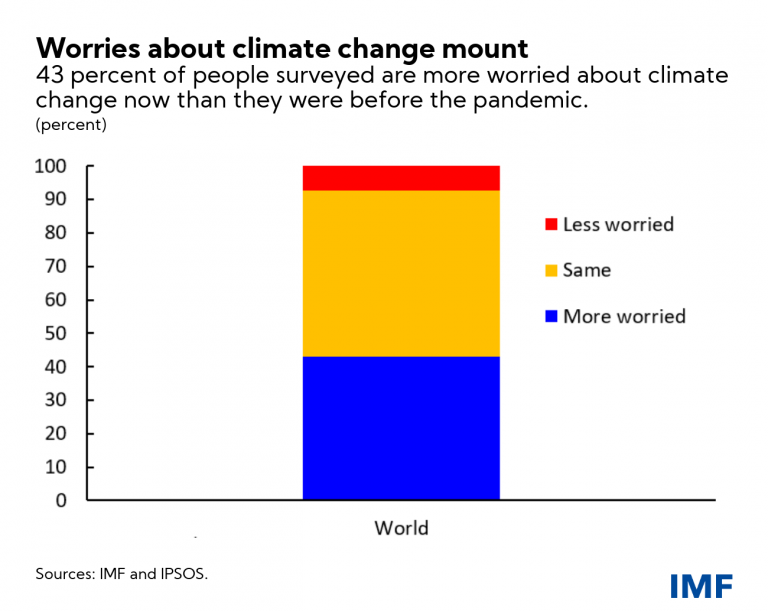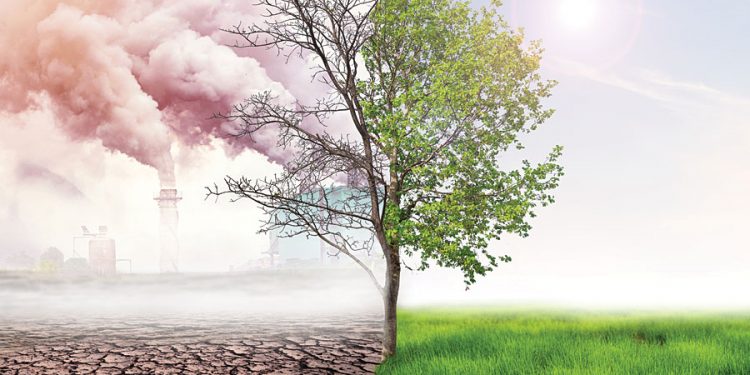While the COVID-19 pandemic continues to ravage the world, climate change—a crisis that can cause even greater destruction—looms. All crises teach us lessons, but the pandemic has gone further: it has reminded us about the power of nature.
A recent Ipsos poll conducted globally for the IMF found that 43 percent of people surveyed reported being more worried about climate change now than they were before the pandemic, with only 7 percent saying they are less worried.
The heightened public awareness about the dangers of unmitigated climate change make this an important moment for policymakers to enact bold reforms. But many challenges lie ahead.

First, let’s note some of the similarities between COVID-19 and climate change. Human behavior is central to both crises. SARS-COV2 spreads between people directly, requiring social distancing for containment. Climate change is mostly caused by emissions of greenhouse gases from human activity, requiring us to use less and cleaner energy.
Both crises are global and economically devastating, and both are likely to disproportionately impact the poor and deepen existing inequalities. The pandemic put millions out of work, which could leave long-lasting scars on economies.
Similarly, unchecked climate change is expected to cause substantial economic damage, disproportionately hurting the poor and potentially triggering large-scale migration.
Both crises require global solutions. The COVID-19 crisis will not be resolved until all countries bring the pandemic under control through widespread vaccination, and the climate crisis will not be solved until all emitters swing into action, bringing global emissions to net zero.
Some of what we observed over the past year are cause for great concern.
The first is short-termism. No country was prepared for the COVID-19 pandemic, despite multiple devastating outbreaks in the past decade (e.g. MERS, SARS, Ebola, Zika) and the multiple warnings by scientists.
Worse still, as COVID-19 hit, some policymakers were unwilling to acknowledge the danger until it was too late, ignoring the advice of public health experts and acting only after large human and economic costs were incurred. This surely begs the question: if it was difficult to react to a danger a few weeks away, then how will we be able to respond to a danger a few decades away?
The second concern is insufficient cooperation. While the collaboration among scientists was unprecedented, cooperation among governments to distribute the vaccines equitably faltered early on, and most countries instead fell back on vaccine nationalism.
Indeed, while no country would accept an internal distribution of the vaccine based on money and power, all countries accepted an international distribution based on those very same criteria, notwithstanding the noticeable exception of the COVAX initiative and recent calls for sharing surplus vaccines and patents.
The power of science
There have also been positive surprises over the past year that allow us to be more optimistic going forward.
The response to the pandemic has shown that a concerted scientific effort can perform miracles. After all, developing a new vaccine typically takes 5 to 10 years according to Johns Hopkins University, and to this day there are not yet vaccines against malaria and HIV/AIDS.
Just last year, most experts estimated that delivering an effective vaccine against COVID-19 would take at least 12 to 18 months, and some doubted it could be done at all. Yet thanks to spectacular collaboration among scientists, generous funding by governments, and private sector ingenuity, vaccines were approved only 9 months after the World Health Organization declared a pandemic.
On climate change too, new technologies are crucial—albeit not sufficient—to cope with the challenge of reducing carbon emissions to net-zero by 2050. Think of industrial scale battery storage, green hydrogen, carbon capture or negative emission technologies. Advancements are needed to lower the costs of such clean technologies and broaden their adoption.
The fast advances in solar panel technology and an 80 percent drop in prices over the past decade suggest that major progress can be achieved quickly if enough resources are committed.
Lessons for climate change mitigation
First, we need a strategy to overcome short-termism from the outset. Short termism is driven by fears of lost jobs and threatened livelihoods. The best way to defeat it is to communicate coherent and credible policies to ensure a “just transition.”
If done right, mitigating climate change—with the use of carbon pricing—can help governments raise revenues that can then be used to create jobs and protect poorer households, which should help societies maintain a longer-term vision toward stopping climate change before it is too late.
Second, we need to recognize that governments play a key role in ending large systemic crises. Governments backstopped financial markets during the Global Financial Crisis for example, and more recently they provided risk capital for the development of COVID-19 vaccines. Similarly, the needed breakthroughs in the development and adoption of green technologies will come only with government support for basic research and infrastructure.
Finally, collaboration across countries will be key. The Paris Climate Agreement has encouraged some countries to scale up their ambition. Yet many countries are falling short of meeting their voluntary pledges to reduce emissions, which collectively are still not ambitious enough to keep global warming below 2°C.
A supplementary agreement among the top emitters—with the adoption of a differentiated carbon price floor to aid monitoring and limit competitiveness concerns—could help countries coordinate. The unprecedented momentum towards climate change mitigation in a number of emitters today should not go to waste, but instead be enshrined in a collective agreement that can draw in more participants over time.
Another key priority is for the global community to provide climate finance and technology transfers to developing economies to help them enhance their mitigation and adaptation efforts. What better time to do so than in the face of the most consequential public health mobilization in a century?








